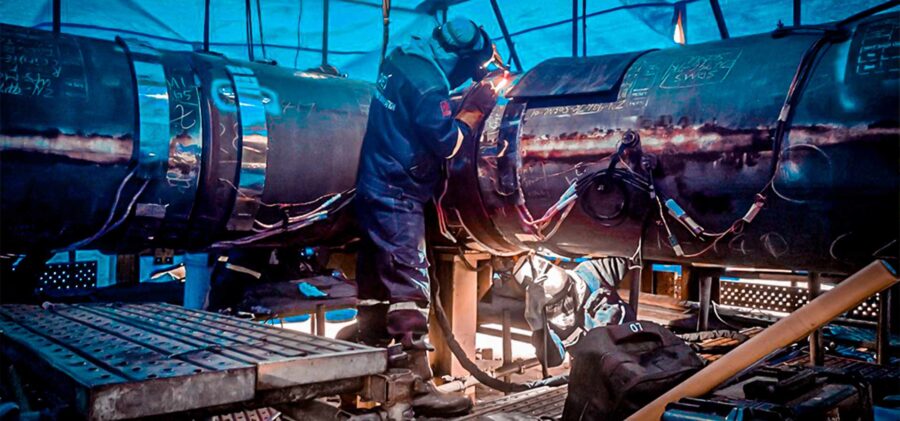
Offshore Welding Vietnam is rapidly becoming a preferred solution for Europe’s pressing shortage of skilled welders in oil, gas, offshore wind, and subsea construction. Across Norway, the Netherlands, Denmark, and the UK, the demand for certified welders far exceeds local availability. European shipyards, fabrication yards, and offshore platforms are under intense pressure to meet tight project deadlines while complying with strict quality and safety regulations. Vietnamese offshore welders, trained to international standards, are stepping in to close this gap with proven skill, discipline, and adaptability.
European Offshore Labour Shortage and Its Impact
The offshore industry in Europe is entering a high-growth phase. The EU’s commitment to 300 GW of offshore wind by 2050, combined with continued investment in North Sea oil and gas, is pushing demand for welding manpower to unprecedented levels. In shipyards alone, contracts for turbine foundation manufacturing, FPSO conversions, and LNG module fabrication require hundreds of welders each year.
However, local recruitment faces significant challenges:
-
Ageing Workforce –The Average age of welders in some EU countries exceeds 50.
-
Vocational Decline – Fewer young workers are entering trade schools.
-
Geographic Limitations – Offshore sites are often located in remote, harsh environments.
The result is delayed projects, higher costs, and increased reliance on imported labour—making Offshore Welding Vietnam a strategic manpower source.
Certification and Technical Readiness
Vietnamese offshore welders typically possess internationally recognised qualifications, ensuring immediate compatibility with European project requirements:
-
ISO 9606-1 & 9606-2 – Qualification tests for steel and aluminium in multiple positions (3G, 4G, 6G).
-
AWS D1.1/D1.2 – Structural welding codes for offshore steel and aluminium structures.
-
ASME Section IX – Essential for welding pressure vessels and high-integrity piping.
-
DNV-OS-C401 – Offshore fabrication standard from Det Norske Veritas.
-
EN 1090 – Compliance for structural steel components in load-bearing applications.
These credentials are validated through rigorous trade tests, often involving non-destructive testing (NDT) such as radiography or ultrasonic inspection. Many candidates also hold BOSIET (Basic Offshore Safety Induction and Emergency Training), ensuring they can be deployed directly to offshore sites without extended onboarding.
Safety-First Approach in Offshore Welding Vietnam
Offshore environments demand strict safety discipline. Vietnamese offshore welders undergo training that goes beyond technical skills:
-
HSE Awareness – European permit-to-work systems, confined space entry, and hot work safety.
-
Offshore Survival Skills – Helicopter underwater escape (HUET), fire safety, and sea survival.
-
PPE Compliance – Proper use of flame-resistant clothing, impact-rated welding helmets, and respiratory protection.
-
Hazard Identification – Recognising corrosion risks, structural fatigue signs, and welding defects in marine conditions.
By pre-training welders to EU safety standards, downtime for employer-led inductions is minimised, enabling faster project integration.
Technical Challenges in Harsh Marine Environments
Offshore welding is not simply onshore welding moved to the sea—it introduces unique technical difficulties:
-
Saltwater Exposure – Accelerates corrosion, requiring precise material selection and welding technique.
-
Dynamic Loading – Structures are constantly subjected to wind and wave forces; weld integrity directly impacts fatigue life.
-
Restricted Access – Many welds occur in tight, awkward spaces, demanding advanced positional welding skill.
-
Extreme Weather – Welders may operate in sub-zero or high-humidity conditions, affecting arc stability.
Vietnamese welders are trained in controlled environments that simulate these conditions, ensuring readiness for real-world offshore challenges.
Applications of Offshore Welding Vietnam in EU Projects
-
Oil & Gas Topsides – Fabrication of processing modules, flare booms, and living quarters.
-
Offshore Wind Turbines – Welding monopiles, jackets, and transition pieces.
-
LNG Infrastructure – Cryogenic piping systems for terminals and floating storage units.
-
Subsea Components – Welding risers, manifolds, and steel catenary risers.
-
Shipyard Conversions – Transforming tankers into FPSOs or FSRUs.
Each category requires specific welding processes—SMAW for structural strength, GTAW for stainless and alloy piping, and FCAW for heavy-gauge steel sections.
Case Study: Offshore Jacket Project in Denmark
In 2024, a Danish offshore fabrication yard faced a severe shortage of FCAW welders for jacket structures. LabourLink Vietnam sourced, tested, and deployed 18 welders within 36 days.
-
Trade Test – EN ISO 9606 FCAW 4G/6G welds under project-specific WPS.
-
Results – 96% first-pass weld inspection rate, exceeding client KPIs.
-
Outcome – Two-week acceleration in delivery schedule, avoiding contractual penalties.
Client feedback emphasised “low defect rates, high productivity, and excellent integration with multinational teams.”
Recruitment and Deployment Process by LabourLink Vietnam
1. Candidate Sourcing – Nationwide database search for welders with offshore or shipyard experience.
2. Skill Testing – Client-approved practical tests with video evidence, verified by independent inspectors (DNV, ABS, BV).
3. Compliance Documentation – Passports, police clearance, medicals, and certification portfolios prepared in EU-friendly formats.
4. Deployment Logistics – Visa processing, safety induction, and travel coordination.
5. Post-Placement Support – Performance monitoring and replacement guarantee (<3% replacement rate).
Advantages of Offshore Welding Vietnam Over Other Sources
-
Speed – Mobilisation within 30–45 days.
-
Skill Depth – Multi-process proficiency (SMAW, FCAW, GTAW).
-
Retention – High contract completion rates.
-
Cost Efficiency – Competitive wages without compromising quality.
-
Cultural Fit – Strong adaptability to European work practices.
Specialisations Available in Offshore Welding Vietnam
-
6G Pipe Welding – Oil, gas, and LNG projects.
-
Structural FCAW Welding – Offshore wind and heavy marine structures.
-
TIG Stainless Welding – High-spec piping for food-grade or chemical-grade offshore systems.
-
Aluminium Welding – Lightweight vessels and offshore platforms
LabourLink Vietnam maintains a comprehensive database of pre-screened welder profiles and training records. When a client submits a staffing request, our team uses this information to identify, test, and mobilise suitable candidates specifically for that project, ensuring skills and certifications match exact technical requirements.